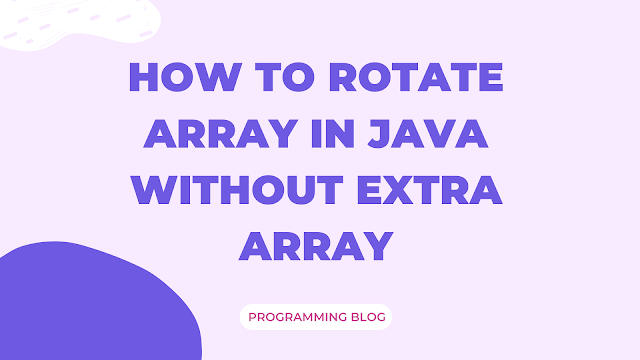Rotate Array LeetCode solution in Java with explanation | Rotate array without extra array
Problem Description :
Given an array, rotate the array to the right by k steps, where k is non-negative.
Example 1 :
Input: nums = [1,2,3,4,5,6,7], k = 3 Output: [5,6,7,1,2,3,4] Explanation: rotate 1 steps to the right: [7,1,2,3,4,5,6] rotate 2 steps to the right: [6,7,1,2,3,4,5] rotate 3 steps to the right: [5,6,7,1,2,3,4]
Example 2 :
Input: nums = [-1,-100,3,99], k = 2 Output: [3,99,-1,-100] Explanation: rotate 1 steps to the right: [99,-1,-100,3] rotate 2 steps to the right: [3,99,-1,-100]
We have to rotate array based on given k number. We have multiple solution for this problem.
- Using Temporary array.
- Recursively rotate array one by one.
- Reverse array and swap the elements
Here, we will seen 3rd solution.
Solution 1 : Rotate array in java without extra space
import java.util.Scanner;
public class RotateArray {
public static void main(String[] args) {
Scanner sc = new Scanner(System.in);
System.out.println("enter array size");
int size = sc.nextInt();
int[] array = new int[size];
System.out.println("Enter values");
for (int i = 0; i < array.length; i++) {
array[i] = sc.nextInt();
}
System.out.println("enter k");
int k = sc.nextInt();
// Check if k is not greater than array size
if (k > array.length) {
k = k%array.length;
}
if (array.length > 1) {
// Reverse an array
for (int i = 0; i < array.length / 2; i++) {
int temp = array[i];
array[i] = array[array.length - 1 - i];
array[array.length - 1 - i] = temp;
}
// Swaping elements from 0 to k
int middle = k-1;
for (int i = 0; i < k/2; i++) {
int temp = array[i];
array[i] = array[middle];
array[middle] = temp;
middle--;
}
// Swaping elements from k to array length
int last = array.length-1;
for (int i = 0; i < (array.length-k)/2; i++) {
int temp = array[i+k];
array[i+k] = array[last];
array[last] = temp;
last--;
}
}
// Print rotate array
for (int i = 0; i <array.length; i++) {
System.out.println(array[i]);
}
}
}
Solution explanation :
- First, reverse an array.
- array = [1, 2, 3, 4, 5, 6, 7], reversed array = [7, 6, 5, 4, 3, 2, 1], k = 3
- Now, swap the array from 0 to k-1.
- swap 0 and k-1 value. swap 0th index value with 2nd index value
- [5, 6, 7, 4, 3, 2, 1]
- Now, swap values from kth index to array length
- swap 3rd index to 6th index
- [5, 6, 7, 1, 3, 2, 4]
- swap 4th index to 5th index
- [5, 6, 7, 1, 2, 3, 4]
- We got solution.
We can also reduce line of code using same approach. lets see code.
Solution 2 : Rotate array in java without extra space
public void rotate(int[] array, int k) {
k %= array.length;
reverse(array, 0, array.length - 1);
reverse(array, 0, k - 1);
reverse(array, k, array.length - 1);
}
public void reverse(int[] array, int start, int end) {
while (start < end) {
int temp = array[start];
array[start] = array[end];
array[end] = temp;
start++;
end--;
}
}

Comments
Post a Comment